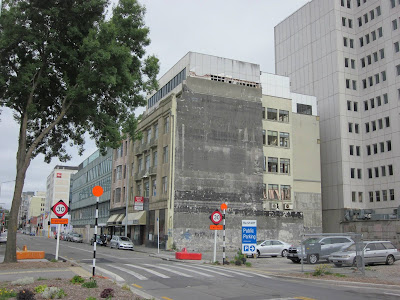Setting Inspiration: Post-Earthquake Christchurch

Time for another visit to New Zealand for our "setting inspirations" blog series. This time I want to talk about Christchurch, which we visited about 5 years after the 6.3 earthquake that devastated the city in early 2011. Even now, the city is struggling. Many have left and/or lost their livelihoods, the streets feel empty and abandoned at night, and there's been a huge increase in crime. The downtown is full of condemned buildings, cordoned-off areas, and empty lots. Rubble and graffiti can be found at every turn. But there are beautiful things too. The city is putting a lot of effort into restoring historical buildings, and there's much in the way of monuments, sculptures, and murals to help raise money or remember the dead. You can still get a lovely boat ride in the canal or visit the huge gardens, and amid the gutted buildings are the sprouts of new life, such as the cardboard cathedral and the boxcar mall (see below). This was one of the fist pict



